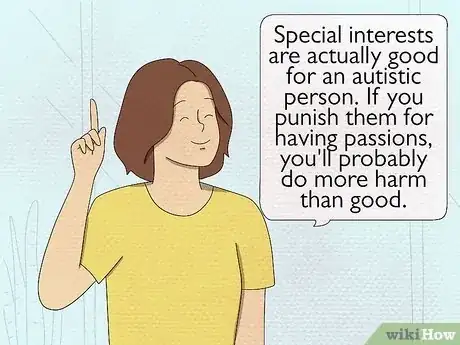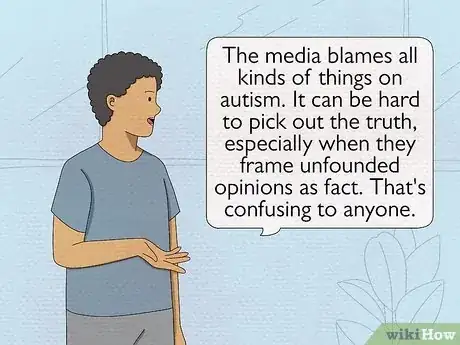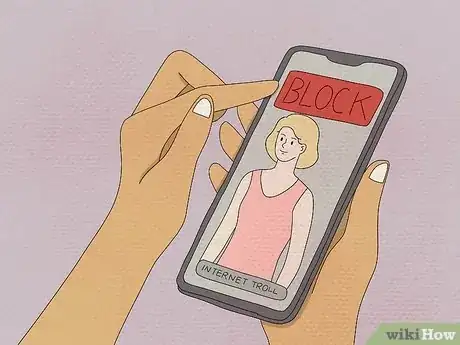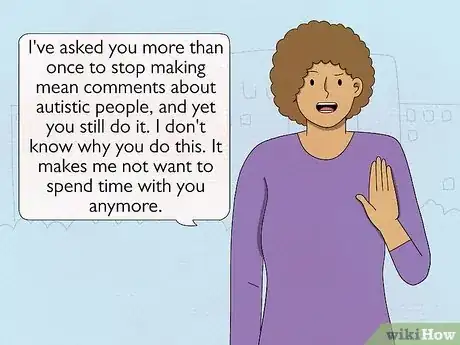This article was co-authored by Luna Rose. Luna Rose is an autistic community member who specializes in writing and autism. She holds a degree in Informatics and has spoken at college events to improve understanding about disabilities. Luna Rose leads wikiHow's Autism Project.
This article has been viewed 36,389 times.
Sometimes, people say ignorant or hurtful things about autism. They may not know any better, or they may not care if they hurt anyone. Whether you're autistic yourself, you love an autistic person, or you just think that kindness and accuracy are important, you can speak up and handle it.
Steps
Handling Well-Meaning People
With a little maturity and grace, it's possible to teach people new things and encourage them to speak more kindly about autism.
-
1Start with the assumption that they are good people who don't know any better. There's lots of misinformation about autism, and people may hear and believe things that aren't true. This doesn't necessarily mean they have bad character. Recognize that there's a good chance the person isn't meaning to do any harm.
- Most people believe in kindness, fairness, and inclusion of people who are different. Assume that this person does too, and just got a little mixed up about how to go about this.[1]
-
2Gently correct any wrong or harmful ideas. Speak kindly and point out the truth. As you write or talk, keep in mind that the person probably wants to be kind and tell the truth, and simply may not know how. You can simply guide them towards what's right.
- "Special interests are actually good for an autistic person. If you punish them for having passions, you'll probably do more harm than good."
- "Bad parenting doesn't cause autism. Both my dads are amazing parents, and they're a big reason why I turned out so well."
- "You may not realize this, but autism isn't actually linked to mass violence. Autistic people are less violent than the general population."
- "My daughter's stimming is important for her ability to focus. She needs to be able to rock back and forth and fidget in class. It may look odd, but it helps her learn, and it's important for her."
Advertisement -
3Give a face-saving out. Showing empathy and understanding can help the person feel less threatened, and more willing to listen to you. Validate their feelings of confusion or frustration while pointing them towards the truth.[2] If you make it sound understandable that they might hear and believe inaccurate things about autism, they might be more willing to admit that they were wrong. Here are some examples of ways to show empathy and help the other person save face:
- "I know it can be so hard to find good information about autism. People say all kinds of things, and it can be difficult to sort out the right things from the wrong ones."
- "TV shows portray autistic people as childlike geniuses or jerks. That can make it harder to understand autism, especially if you haven't met many autistic people."
- "Your kid was just diagnosed last month, right? Of course you're worried and confused. The media treats autism like a death sentence, and that's scary."
- "The media blames all kinds of things on autism. It can be hard to pick out the truth, especially when they frame unfounded opinions as fact. That's confusing to anyone."
-
4Be willing to listen to their thoughts and feelings. They may agree that good information is hard to find, and share their frustrations about this. Or they might ask for advice on handling a person who gave them bad information. Be there to reassure them and help them with any problems they discuss having.
-
5Show you're glad that they listened. Smile at them, and speak positively. This helps them feel good about admitting they were wrong (which can be a difficult experience!) and listening to you.
Handling Bigots
-
1Recognize that a person who refuses to listen may be a bigot. Gently pointing out the truth usually works, but in rare cases, a person doesn't care about the truth or about the impact of their words. If your good-faith attempt isn't met with a good-faith response, then you may be dealing with a bigot.
-
2Show disapproval, without letting them suck you into an argument. Arguing with a bigot is likely to leave you feeling frustrated and drained, and you will never change their mind. Instead, signal that their behavior is inappropriate and unappreciated. Freezing them out may get them to realize that they won't get attention or approval by acting this way. Give them a chilly stare and give a pointed remark like:[3]
- "Seriously?"
- "Wow."
- "Okay then." (followed by a subject change)
- "No."
-
3Block and report an internet troll. Your average troll is an attention-seeker who hopes to be noticed by starting fights. You can discourage this behavior by blocking and reporting. This starves them of the attention they're so desperate for, and may even get them kicked off the site.
- If your friends want to fight the troll, encourage them to freeze the troll out instead.
- Some websites are very lax about bullying and bigotry, and may do nothing. This isn't your fault. You did the best you could.
-
4Distance yourself from a mean person. If someone repeatedly makes ableist remarks after you've asked them to stop, then this says something about their character, and you are not obligated to put up with them. Minimize the time you spend with them, or cut them off completely.
- If they ask why, be honest about how their behavior impacts the relationship:[4] "I've asked you more than once to stop making mean comments about autistic people, and yet you still do it. I don't know why you do this. It makes me not want to spend time with you anymore."
Caring For Yourself
-
1Remember that you are never obligated to provide a teachable moment. If you're tired, or stressed, or just not in the mood for doing emotional labor, you don't have to deal with an ignorant comment. You have every right to sigh and walk away.
-
2Give yourself time and space to deal with any difficult feelings. Words can hurt. You're allowed to be upset about someone saying cruel or hurtful things. Allow yourself to work through those feelings, and be patient. Sometimes you need to be angry or sad for a while before you can feel better.
- Talk to a good listener.
- Write in a journal.
- Set aside time to think it over.
- Write a letter with everything you wish you could say. Then rip it up and throw it away.
- Ask a mentor how to handle any overwhelming feelings.
-
3Surround yourself with positive people. Look for kind, caring people who are supportive towards autistics. Choose to be around the people who help you feel good about yourself, your loved ones, and the world.
- The Autistic community online can be a great source of support.
-
4Remember to be kind to yourself. If you're an autistic person experiencing bigotry, it can get you down. You may even start to believe some of the things that people say. Be gentle and patient with yourself.
Expert Q&A
-
QuestionHow do you cope with people who insult you?
 Luna RoseLuna Rose is an autistic community member who specializes in writing and autism. She holds a degree in Informatics and has spoken at college events to improve understanding about disabilities. Luna Rose leads wikiHow's Autism Project.
Luna RoseLuna Rose is an autistic community member who specializes in writing and autism. She holds a degree in Informatics and has spoken at college events to improve understanding about disabilities. Luna Rose leads wikiHow's Autism Project.
Community Expert Someone who says something offensive isn't always trying to be hurtful. Sometimes they just don't know better and need a little guiding.
Someone who says something offensive isn't always trying to be hurtful. Sometimes they just don't know better and need a little guiding. -
QuestionHow do you walk away from an argument online?
 Luna RoseLuna Rose is an autistic community member who specializes in writing and autism. She holds a degree in Informatics and has spoken at college events to improve understanding about disabilities. Luna Rose leads wikiHow's Autism Project.
Luna RoseLuna Rose is an autistic community member who specializes in writing and autism. She holds a degree in Informatics and has spoken at college events to improve understanding about disabilities. Luna Rose leads wikiHow's Autism Project.
Community Expert Give people the benefit of the doubt, even online. I've unfortunately seen some of the negative sides of the community online. I think it's a result of collective trauma in our community, that sometimes conversations become reactive and polarized, and people lash out at someone who just doesn't know better, but doesn't mean any harm. Know that someone who might appear like an enemy could really be just a potential friend who's got the details a little confused.
Give people the benefit of the doubt, even online. I've unfortunately seen some of the negative sides of the community online. I think it's a result of collective trauma in our community, that sometimes conversations become reactive and polarized, and people lash out at someone who just doesn't know better, but doesn't mean any harm. Know that someone who might appear like an enemy could really be just a potential friend who's got the details a little confused.
Warnings
- People who speak cruelly may have few qualms about acting cruelly. If someone seems like a bully, or like they might be dangerous, trust your instincts and stay away.⧼thumbs_response⧽
References
- ↑ https://www.deviantart.com/misslunarose/art/Callout-culture-and-apologies-743626189
- ↑ http://angrycustomer.org/faq/index.php?action=artikel&cat=8&id=16&artlang=en
- ↑ https://captainawkward.com/2016/11/12/917-how-to-set-boundaries-with-people-who-think-boundaries-and-hurt-are-manipulative-aka-help-implementing-boundary-advice/
- ↑ https://captainawkward.com/2012/04/11/225-restating-boundaries-with-a-clingy-friend/








































































